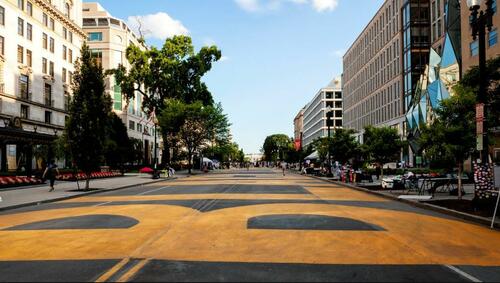'Trucker Lives Matter' Street-Mural Case Fails On Appeal
Authored by John Gallagher via FreightWaves.com,
A federal appeals court on Tuesday upheld a ruling that a trucking group’s First Amendment rights were not violated when the group’s request to paint “Trucker Lives Matter” near the U.S. Department of Transportation was denied.
The lower court case, a lawsuit by the Small Business in Transportation Coalition (SBTC) against Washington Mayor Muriel Bowser, was filed in 2020 in the U.S. District Court for the District of Columbia after the city’s Department of Public Works — at the direction of Bowser — commissioned artists and city employees to paint “Black Lives Matter” in large yellow letters on a two-block stretch of 16th Street NW.
Two months later, SBTC sought a permit from the Bowser administration to paint “Trucker Lives Matter” on a street near DOT, but the city denied the request on grounds that it “does not issue permits to install markings on open D.C. roadways and sidewalks.”
SBTC claimed in its lawsuit that failing to provide a reasonable basis for denying its right to paint its message on one street while allowing “Black Lives Matter” to be painted on another constituted a First Amendment viewpoint discrimination violation.
“Put differently, SBTC’s claim is that the District had created a public forum in which it had allowed certain viewpoints to be expressed while censoring SBTC’s message,” summarized District Court Judge Richard Leon.
Leon noted in his decision, however, that he was compelled to conclude that the “Black Lives Matter” mural, unlike the SBTC’s message request, was government speech. “Indeed, the mural constituted a purposeful communication of a [chosen] message by Mayor Bowser on behalf of the District,” he stated.
“Though the mural is distinct from the typical uses of street painting by the District, I have no trouble concluding that the public would reasonably conclude that, by virtue of its lasting presence on a major downtown street, combined with the renaming of that portion of the street as ‘Black Lives Matter Plaza,’ the mural was a message from the District itself rather than private expression.”
On appeal to the U.S. Court of Appeals for the District of Columbia Circuit, SBTC challenged this ruling and also argued that the district court erred in proceeding to summary judgment without allowing SBTC to conduct discovery.
Regarding the lower court’s government speech decision, the appeals court ruled that determining if speech should be attributed to the government is guided by three criteria: the history of the expression at issue, the public’s likely perception as to who (government or a private person) is speaking, and “the extent to which the government has actively shaped or controlled the expression.”
But SBTC, the court asserted, argued only that the mural cannot be government speech because it was not ratified by the District’s legislature — the city council — and that it is SBTC’s view that speech cannot be held as government speech when only one government official acts to promote that speech.
“That argument has no basis in precedent,” the court ruled. “The Coalition, for its part, has cited no relevant authority for the proposition that the head of the executive branch of government cannot engage in government speech without the approval of the legislature.”
As for SBTC’s argument that it was not allowed the opportunity for discovery, the appeals court noted that SBTC “expressly agreed to forgo any and all discovery” before the district court.
https://ift.tt/UZdNaoi
from ZeroHedge News https://ift.tt/UZdNaoi
via IFTTT





0 comments
Post a Comment